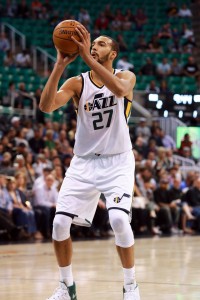After having set their 15-man rosters for the start of the regular season on Monday, many NBA teams will have more decisions to make by next Monday. October 31 is the deadline for clubs to exercise 2017/18 options on rookie contracts and to sign players entering the final year of their rookie deals to extensions.
While most of those team option decisions are fairly straightforward, those extension negotiations will be trickier. Teams and players must not only decide how many years and dollars they would be willing to accept — they also must determine if it even makes sense to complete an extension now, before a deal on a new Collective Bargaining Agreement is reached.
A new CBA isn’t expected to change rookie-scale extensions significantly, but that’s not set in stone yet, and as Zach Lowe of ESPN.com reports, there may be slight changes to restricted free agency. Currently, the cap holds for restricted free agents are either 200% or 250% of their previous salaries. Those figures may increase to 250% and 300% in the new CBA, according to Lowe, who points out that the tweak could affect teams who hold off on rookie extensions in the hopes of maximizing their cap space the following summer.
For instance, last fall, the Wizards and Pistons held off on extending Bradley Beal and Andre Drummond, respectively, since agreeing to new deals at that point would have meant both players counted against their respective teams’ caps for $22MM+ as soon as this year’s July moratorium ended. Instead, since they were unsigned at the end of the moratorium, their teams were able to work around their modest cap holds to sign other free agents, then go over the cap to lock up their RFA stars to max deals. Increased cap holds for RFAs may serve as a minor deterrent for that practice.
Despite the uncertainty involved in working out an extension now, several teams and players will still engage in talks and see if they can come to an agreement. With next Monday’s deadline fast approaching, here are five extension-eligible players we’ll be keeping an eye on:
1. Dennis Schroder (Hawks)
Within his previously-linked piece, Lowe reports that Schroder and the Hawks are talking about a potential extension. However, it may be tricky to pin down the point guard’s value at this point. If Atlanta is especially optimistic about Schroder’s chances of taking Jeff Teague‘s old starting job and running with it, it could make sense to try to lock him up now, before his value skyrockets. But Schroder knows he’s in line for a major opportunity this season, and won’t want to accept a deal that pays him for his past production.
If the Hawks are willing to do a Reggie Jackson-like deal for Schroder, perhaps the two sides could work something out. But both the team and the player have reason to proceed with caution and wait to see how Schroder handles the full-time starting job, so they may wait until next summer.
2. Rudy Gobert (Jazz)
The Jazz will almost certainly have to offer Gobert a maximum-salary deal to retain him, so it may just a matter of whether they do it now or later. If they can get the big center to accept anything lower than the max this week, it probably makes sense to lock him up. If not, there’s no real rush. Still, Utah currently has the opportunity to extend both Gobert and Derrick Favors, and signing both players long-term would be a strong move for the franchise with Gordon Hayward facing potential unrestricted free agency in 2017.
3. Steven Adams (Thunder)
The Thunder have three extension candidates, in Adams, Victor Oladipo, and Andre Roberson. Roberson isn’t as crucial a piece as the other two players, and Oladipo is reportedly seeking a max deal, making Adams a logical target this week. Like the Jazz with Gobert, the Thunder are probably better off locking up Adams sooner rather than later if he’s willing to take something below the max, as Giannis Antetokounmpo did with the Bucks. With Kevin Durant and Serge Ibaka no longer in the mix in Oklahoma City, Adams is poised to take another huge step forward this year, and would have plenty of suitors willing to give him huge offer sheets next July.
4. Kentavious Caldwell-Pope (Pistons)
Stan Van Gundy has said the Pistons would like to extend Caldwell-Pope before Monday’s deadline, and the team has reportedly engaged in negotiations with both KCP and teammate Reggie Bullock. Caldwell-Pope won’t come cheap though. A recent report from Vince Ellis of The Detroit Free Press suggested that the shooting guard’s camp may have be seeking an annual salary in excess of $20MM. And given the contracts signed this summer by two-guards and wings like Nicolas Batum, C.J. McCollum, and Evan Turner, that asking price doesn’t seem particularly unreasonable. If it comes down, the two sides could reach a compromise, but I’d expect KCP to play out the season without a new deal lined up.
5. Gorgui Dieng (Timberwolves)
Dieng and teammate Shabazz Muhammad are both eligible for extensions, but the big man appears to be the more likely candidate for a new deal this week. New head coach Tom Thibodeau is reportedly fond on Dieng, and Minnesota has plenty of long-term cap flexibility to lock up core pieces. Darren Wolfson of 1500 ESPN Twin Cities reported last month that no meaningful talks had occurred for either Dieng or Muhammad, and suggested he expects both players to reach restricted free agency. But those extension talks could get more meaningful in the next few days, with a deadline looming, so it’s worth keeping an eye on the Wolves.
Other notable extension candidates to watch:
